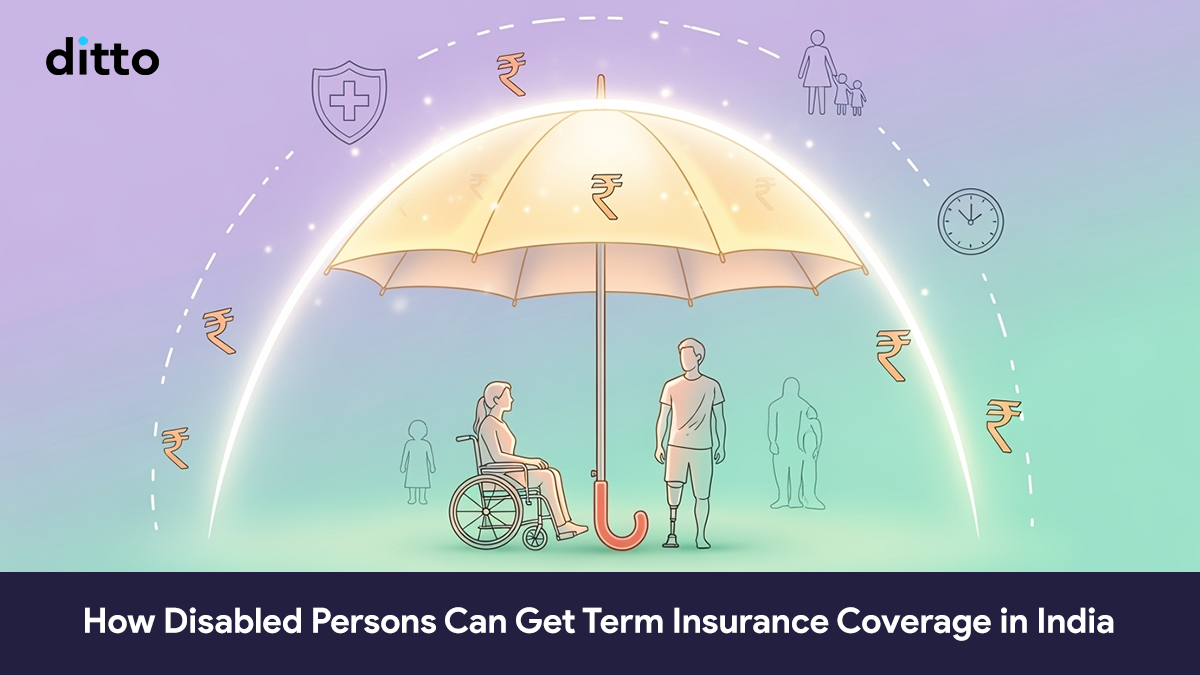| What is Term insurance for disabled person? Term insurance for disabled person is a life insurance plan that provides financial protection to dependants in case of the policyholder’s death. While the core benefits are the same as regular term insurance, the application process may involve additional medical checks and underwriting to assess disability-related risks. |
Life can be more challenging when you face physical or medical disabilities. Still, securing financial protection for your loved ones remains essential. This is where term insurance for disabled persons provides a reliable safety net to ensure that your family’s future is protected. This allows nominees to manage healthcare and daily expenses without relying on alternative income sources.
However, obtaining such coverage may involve additional steps. This is because underwriting considers factors such as income, medical history, and the nature of the disability, hence, insurers assess applications carefully. The good news is that many still offer plans tailored to accommodate these considerations and support the needs of disabled individuals.
This blog offers a comprehensive guide on standard recommendations, underwriting considerations, claim processes, alternative insurance options, and relevant IRDAI guidelines. It aims to empower disabled persons and their families to make informed decisions about term insurance.
If you’d like expert guidance tailored to your situation, you can book a free call. Our advisors will walk you through your options, explain insurer requirements clearly, and help you make confident decisions about protecting your family’s future.
Can a Disabled Person Buy Term Insurance?
Yes, persons with disabilities can buy term insurance, but issuance depends on specific underwriting assessments conducted by insurers.
Key factors influencing acceptance include the insured’s disability certificate, and the specific nature and progression of the disability. The insurer assesses these elements carefully to determine eligibility and coverage terms.
For example, severe disabilities such as those caused by motor neuron diseases typically result in rejection because these conditions significantly increase mortality risk for insurers.
Among insurers, HDFC Life, an insurer we work closely with, is known to be more accommodating to applicants with complex pre-existing disabilities. Since we interact directly with them, we know they are generally more disability-friendly.
However, if HDFC Life rejects the application, other insurers are also likely to decline as most follow similar underwriting rules.
Term Insurance for Disabled Person: Underwriting Parameters
When applying for term insurance for Disabled Person, insurers carefully evaluate:
- Insurers ask for age & income proof to decide the maximum coverage a person is eligible for.
- Medical reports detailing the disability, its severity, and prognosis, along with a disability certificate issued by authorized medical authorities.
- The nature and progression of the disability, with chronic and severe conditions such as motor neuron diseases or severe forms of cerebral palsy leading to higher rejection chances.
- Any other existing comorbidities such as diabetes or cardiac conditions that impact mortality risk.
This underwriting approach ensures fair risk assessment while attempting to extend coverage to disabled individuals wherever feasible.
Many insurers publish their underwriting philosophy for persons with disabilities (PWDs), mental health conditions, and HIV. You can check out HDFC Life underwriting rules and ICICI Prudential Life underwriting guidelines in these guides.
Practical Tips for Getting Term Insurance with a Disability
- Choose insurers known for disability-friendly underwriting such as HDFC Life.
- Maintain accurate and comprehensive documentation including latest medical certificates and disability proof.
- Start with a lower sum insured (₹25L–₹1 Cr) to test the insurer’s risk assessment and willingness to provide coverage. If approved, you can increase coverage later as needed.
- Understand that acceptance is subject to insurer discretion and careful underwriting; no guaranteed issuance.
Check out our guide on how to buy the best term insurance plan.
Claim Process for Term Insurance of Disabled Person
Once a policy is issued, the claim process for a disabled person’s term insurance generally remains similar to claims for any other insured individual. When the insured person unfortunately dies during the policy term, the nominee (who may be the disabled dependent) is eligible to receive the sum assured as per the policy terms.
Insurers may require submission of death certificate and claim documents, including disability proofs if relevant to the claim. No separate waiting periods or additional claim criteria apply specific to disabilities.
What If Term Insurance Application Is Rejected?
If term insurance for Disabled Person is rejected due to underwriting risks, individuals can consider the following alternatives which pose lower risk for insurers:
- Endowment Plans: These offer life cover along with maturity benefits, combining insurance and savings. They are less risky for insurers due to the lower sum assured on death and higher premiums payments and thus more accessible for higher-risk applicants.
- ULIPs (Unit Linked Insurance Plans): These provide insurance plus investment benefits and typically have a longer lock-in period. At Ditto, we refrain from recommending ULIPs because their investment-linked structure combines market risk with insurance, which can make them less straightforward for individuals seeking focused life coverage. But if the term insurance application is rejected, this option can be tried out.
- Government Schemes and Post Office Insurance: In addition to private insurance products, disabled individuals can explore insurance and savings options offered by government schemes and the India Post Office.
- Pradhan Mantri Jeevan Jyoti Bima Yojana (PMJJBY): A government-backed, one-year renewable term life scheme with a low premium of ₹436 per year and ₹2 lakh cover. Eligibility requires a savings account and age between 18–50 years, with no disability-specific exclusions. Enrollment is simple, with no medical exam needed, making it accessible for those often declined by private insurers.
- Postal Life Insurance (PLI) & Post Office Schemes: PLI, run by India Post, offers plans for physically handicapped individuals with guaranteed returns and low premiums, though a medical exam is often required to assess impairment.
Both endowment plans and ULIPs provide some financial coverage and investment opportunities, though their features and premium structures differ from pure term insurance.
Term Insurance for Disabled Persons in India: IRDAI Guidelines
IRDAI has not issued specific life insurance guidelines for persons with disabilities (PWDs). However, it mandates that health insurance must cover them. Life insurers can set their own terms based on risk assessment.
At the same time, under the RPWD Act, 2016 and UN conventions, they cannot discriminate against PWDs. Insurers are also encouraged to design inclusive products.
Key points:
- Insurers cannot deny coverage for disabilities that don’t pose high underwriting risk.
- They are encouraged to offer suitable term insurance for disabled persons.
- Insurers must clearly disclose their underwriting rules and claim procedures, and provide reasons if an application is rejected.
Popular Term Insurance for Disabled Persons in India
| What is Term insurance for disabled person? Term insurance for disabled person is a life insurance plan that provides financial protection to dependants in case of the policyholder’s death. While the core benefits are the same as regular term insurance, the application process may involve additional medical checks and underwriting to assess disability-related risks. |
While no specific policies are exclusively marketed solely for disabled persons, several leading term insurance providers including HDFC Life, ICICI Prudential, and Axis Max Life Insurance extend coverage to disabled applicants subject to standard underwriting practices. Plans to consider include:
- HDFC Life Click 2 Protect Super (noted for inclusive underwriting approach).
- ICICI PRUDENTIAL iProtect Smart Plus
- Axis Max Life Insurance Smart Term Plan Plus
Always verify specific terms, disability acceptance criteria, and rider benefits directly with the insurer.
How to Choose the Right Term Insurance for Disabled Person: Ditto’s Take
- Review the insurer’s underwriting policies and disability-specific guidelines to understand how they assess applications.
- Provide accurate medical records and official disability certificates to support your application.
- Consider possible disability riders for premium waivers or income protection (though availability may depend on underwriting).
- Factor in family financial needs, inflation, and long-term care costs when deciding sum assured
- If the risk of term plan rejection is high, consider endowment plans for guaranteed maturity benefits.
- Consult insurance advisors (like us) to guide you about disability-inclusive products and make informed decisions.
To understand the basics of term insurance; its features, benefits, and suitability, check out our detailed guide on how term insurance works.
Buy the Right Term Insurance through Ditto
At Ditto, we’ve assisted over 8,00,000 customers with choosing the right insurance policy. Why customers like Piyush below love us:

✅No-Spam & No Salesmen
✅Rated 4.9/5 on Google Reviews by 15,000+ happy customers
✅Backed by Zerodha
✅Dedicated Claim Support Team
✅100% Free Consultation
You can book a FREE consultation here. Slots are running out, so make sure you book a call now.
Conclusion
Term insurance for disabled persons can be an essential financial safety net for millions of individuals and their families. While underwriting scrutiny is often heightened due to the mortality risks linked with severe disabilities, insurers like HDFC Life strive to balance inclusion with careful risk assessment.
Because of this, disabled persons should be prepared with thorough documentation and realistic expectations about policy issuance. If term insurance is not approved, alternatives such as endowment plans or ULIPs can still provide valuable protection.
Supporting this approach, IRDAI guidelines reinforce insurers’ obligations to provide disability-inclusive coverage in a transparent manner. With the right planning and choices, disabled persons can secure meaningful financial protection to safeguard their dependents.
If you’d like expert guidance tailored to your situation, you can book a free call. Our advisors will walk you through your options, explain insurer requirements clearly, and help you make confident decisions about protecting your family’s future.
Frequently Asked Questions(FAQs)
Can a Disabled Person buy term insurance?
Yes, a Disabled Person can buy term insurance, subject to underwriting by the insurer. The insurer assesses income, medical history, disability certificate, and the nature of disability before issuing coverage. Severe disabilities that increase mortality risk may lead to rejection.
What parameters do insurers consider while underwriting term insurance for Disabled Person?
Key parameters include the applicant’s income, detailed medical reports, official disability certificate, nature and progression of the disability, and any existing health conditions. These help insurers evaluate risk and decide on issuance.
Are there any disability riders available on term insurance for Disabled People?
No. Disability riders such as waiver of premium or income support are generally not available to applicants who are already disabled at the time of application.
What if a Disabled Person’s term insurance application is rejected?
If a term insurance application is rejected, alternatives like endowment plans and ULIPs can be considered. These options present lower risk to insurers and may be more accessible for Disabled Persons seeking life coverage.
Is the claim process different for term insurance of Disabled person?
No, the claim process for term insurance of a Disabled Person is largely the same as for other insured individuals. Upon death during the policy term, the nominee receives the sum assured after submitting death and claim documents.
How does IRDAI regulate term insurance for Disabled persons?
IRDAI guidelines promote inclusive insurance coverage, prohibit unfair discrimination, require transparent underwriting practices, and encourage insurers to develop products suitable for disabled individuals.
How to choose the right term insurance for a Disabled Person?
Choosing the right term insurance involves checking insurer underwriting philosophy, ensuring proper medical and disability documentation, considering riders if eligible, and weighing alternatives like endowments or ULIPs if term insurance is not available.
What are the benefits of term insurance for Disabled person?
Term insurance for Disabled Person provides financial security to their dependents, covers outstanding liabilities, and helps maintain family livelihood in case of the insured’s untimely death, subject to acceptance by the insurer.
Last updated on:










